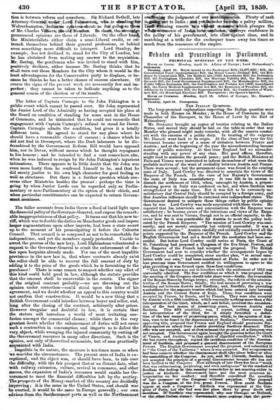The fuller accounts from India throw a flood of lurid
light upon thefmancial pelicyof the Governor-General, and expose the remark- able inappropriateness of that policy. It turns out that his new ta- riff„, which was to double the.uties on Manchester goods and impose larger augmentations upon other imports, had been a state secret np to the moment of his promulgating it before the Calcutta Council. That council is so composed as not to be remarkable for independence, and yet the members openly protested. Unable to arrest. the process of the new levy, Lord Elphinstonavolunteered a raped to the Governor-General to remit the enforcement of du- ties upon bargains already made. For one of the most impolitic provisions in the new law is,, that where contracts already exist the. seller shall be able to recover the full amount of duty by adding it to the price of the goods which be is furnishing. to the purchaser ! There is some reason to suspect whether any edict of this kind could hold good in law, although the statute provides that the amount shall be recoverable in the courts. The signer of the original contract probably—we are throwing out the opinion under correction—could, stand, upon the letter of his agreement, and we doubt whether an appeal to this country would' not confirm that, construction. It would' be a new thing that a British Government could interfere between buyer and seller„ and, long after the closing of the contract,. arbitrarily alter prices. However irregular and doubtful in law, it is certain that the statute will introduce a world of most irritating con- fusion amongst the commercial classes ; while there is the very greatest doubt whether the enhancement of duties will' not cause such a contractionia consumption and imports as to defeat the very object, while avenging the injured community by cutting off the.Government resources in many other directions. Such is the opinion, not only ofthe,oretieal economists, but of men practically acquainted with India.
Impolitic in its nature, the measure is ten.timos more so when we ooneider the circumstances. The present state of India is ex- ceptional, and the object was, or should' have been, to tide over the difficulty, with the fair prospect that at no, distant date, what with railway extension,. culture, revival in commerce, and other ,means, the expansion. of resources would* enable her Go- vernment to meet the financial difficulties left by-the mutiny. The prospects of the Money-market of this country are decidedly improving ; it is the same in the United States, and should war be averted, it would be the.same inEurope generally ; our own advices- front the Southernmost ports as well as the Northernmost confErming the judgment of our contemporaries. Plenty of cash is goinignat to India ; smet yet in, order to raise a paltry million, L=1 Alining resorts to a violent measure which plunges the wllq eree of Intia into. confusion, destroys confidence in the irolThy'. of his government, sets erase against class, and in snatching at a trifle for the exchequer tears away ten times as much from the resources of the empire.


























 Previous page
Previous page